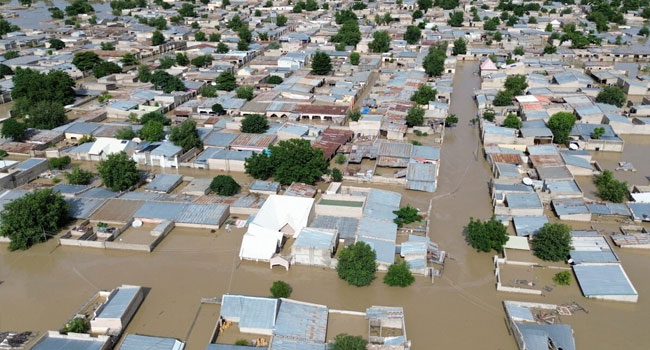The Food and Agriculture Organisation (FAO) of the United Nations says it has developed a flood-trigger framework to mitigate the impact of the disasters in Nigeria.
The UN organisation said it achieved the feat in collaboration with key stakeholders.
The Climate Smart Agriculture Specialist of the FAO in Nigeria, Mr Gift Umor disclosed this during the National Flood Trigger Framework Development Workshop organised by FAO on Wednesday in Yola.
The event was held in collaboration with the Nigeria Hydrological Services Agency (NIHSA), Nigeria Meteorological Agency (NiMet), National Space Research and Development Agency (NASRDA).
Others included the National Emergency Management Agency (NEMA), and State Emergency Development Agencies from Borno, Adamawa and Yobe, funded by the German Government.
According to Umor, the workshop aims to enhance the capacity of stakeholders in flood damage assessment and to establish a unified framework for preparedness and anticipatory action.
The specialist said “a lot of stakeholders and government agencies implement various activities to mitigate the impact of flooding in the country.
“However, we identified a significant gap, which was lack of a unified framework to support anticipatory action across partners.
“Currently, partners work individually, but this framework will enable joint efforts to combat the disaster that devastated communities in recent years.”
He emphasised that the workshop reflected FAO’s commitment to supporting flood-prone communities and advancing disaster preparedness across the country.
The Deputy Director, NIHSA, Mr John Gbadegesin, urged citizens residing in flood-prone areas to consider relocation to minimise the impact and save lives.
He said “NIHSA provides early warning information, promptly disseminated to state governments, local communities, critical stakeholders and humanitarian organisations.
“However, in many flood-prone areas, residents often hold on to traditional beliefs, cultural ties and emotional attachments to their communities.
“We hope this workshop fosters renewed collaboration among federal and state actors, leading to reduced flood impact and a shift in public attitude toward flood preparedness.”
An Assistant Director, NASRDA, Mr Ademuyiwa Oyewumi, highlighted the essential role of earth observation satellites in disaster preparedness,
response, recovery and management.
Oyewumi explained that satellite data is invaluable, providing insights into forecasts, flood extents and damage assessments through satellite imagery to assist in resource allocation and planning.
He said that through the adoption of collaborative framework, key stakeholders would be able to create an approach to reduce flood risks, protect lives and build resilient communities.
NAN


